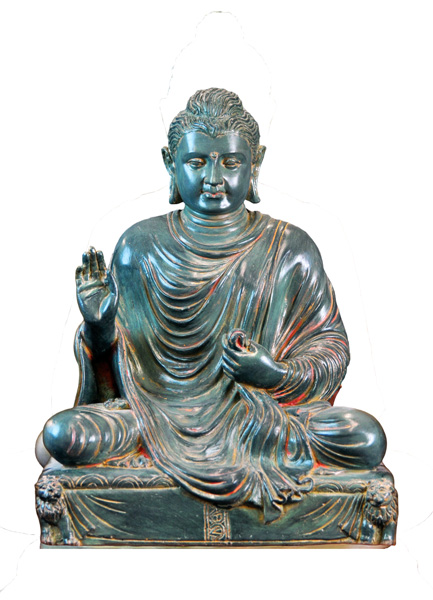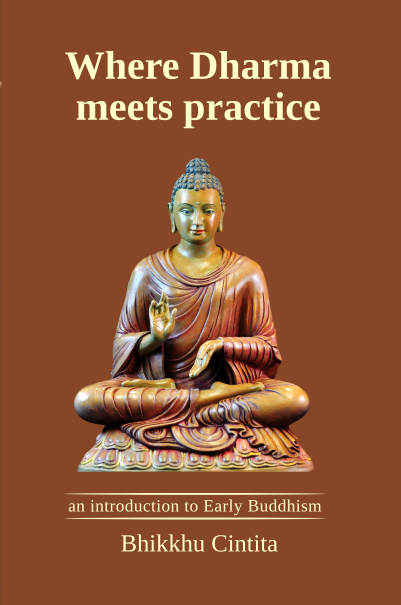
There is, monks, an unborn, an unbecome,
an unmade, an unconditioned.
If, monks, there were no unborn, no unbecome,
no unmade, no unconditioned,
then no escape would be discerned
from what is born, become, made, conditioned.
But because there is an unborn, an unbecome,
an unmade, an unconditioned,
therefore an escape is discerned from what is born, become,
made, conditioned. (Iti 43)
Still under construction
Awakening
home > study & practice > awakening
ā ī ū ṅ ṃ ṁ ñ ṭ ḍ ṇ ḷ Ā Ī Ū Ṅ Ṃ Ñ Ṭ Ḍ Ṇ Ḷ
Liberation (vimutti), awakening (bodhi) and nibbāna (Sanskrit, nirvāna) describe both the beginning and end of the Buddhist path. It is the beginning in that the Buddha’s awakening and the potential for awakening in ourselves represent the highest aspiration we might have as we undertake Buddhist practice. It is the end in that its achievement is the culmination of successful Buddhist practice. It is also the middle in that it provides the compass we use to find our way through the many vicissitudes of practice. This is the stock description of its occurrence: Dwelling alone, secluded, heedful, ardent, and resolute, he … reached and remained in the supreme goal of the holy life for which clansmen rightly go forth from home into homelessness, knowing and realizing it for himself in the here and now. He knew: “Birth is ended, the holy life fulfilled, the task done. There is nothing further for the sake of this world.” (AN 6.55, etc.)

Bhikkhu Cintita, 2025, Where Dharma Meets Practice: an introduction to Early Buddhism. This book presents a very concise, readable, and practical introduction to early Dhamma, with particular attention to making the ancient teachings accessible for the modern Buddhist. Its chapters focus on the Buddhist life in accord with Dhamma, with virtue, with devotion, and with wisdom.
In common usage, liberation means the freedom to do what you want: If you want to speak harshly of others, freedom of speech allows you to do so. If you want to eat ice cream, money in your pocket ensures that you can. In Buddhism, liberation is something deeper: It is freedom from having to want. Buddhist practice begins with precepts and generosity and the discovery that personal well-being is also found there. It deepens into the project of purification of mind, where we encounter resistance in the form of deeply rutted greed, hatred and delusion in many manifestations. In the end, it is our delusions, our persistent mis-perceptions and convoluted ways of viewing things that lie at the knotty root of the human condition, only to be dug up with the help of penetrating wisdom. The constraints of our own entangled minds, in spite of relentless effort, perpetuate a fearful and needy self ever discontent with the world. Breaking through these complexes completes liberation, attains awakening and realizes nibbāna. It remains to describe the unfolding of this attainment.
Awakening is generally regarded as ineffable, a mystical state that cannot be described with words, to be approached only through analogy or through poetry, like describing sight to the blind. Nonetheless, there are at least three systematic perspectives on awakening provided in the early teachings that help us to gain some conceptual understanding of what awakening is, and also to track our progress toward awakening. These perspectives are cosmology, dependent co-arising and the fetters.
In common usage, liberation means the freedom to do what you want: If you want to speak harshly of others, freedom of speech allows you to do so. If you want to eat ice cream, money in your pocket ensures that you can. In Buddhism, liberation is something deeper: It is freedom from having to want. Buddhist practice begins with precepts and generosity and the discovery that personal well-being is also found there. It deepens into the project of purification of mind, where we encounter resistance in the form of deeply rutted greed, hatred and delusion in many manifestations. In the end, it is our delusions, our persistent mis-perceptions and convoluted ways of viewing things that lie at the knotty root of the human condition, only to be dug up with the help of penetrating wisdom. The constraints of our own entangled minds, in spite of relentless effort, perpetuate a fearful and needy self ever discontent with the world. Breaking through these complexes completes liberation, attains awakening and realizes nibbāna. It remains to describe the unfolding of this attainment.
ā ī ū ṅ ṃ ṁ ñ ṭ ḍ ṇ ḷ Ā Ī Ū Ṅ Ṃ Ñ Ṭ Ḍ Ṇ Ḷ
Awakening is generally regarded as ineffable, a mystical state that cannot be described with words, to be approached only through analogy or through poetry, like describing sight to the blind. Nonetheless, there are at least three systematic perspectives on awakening provided in the early teachings that help us to gain some conceptual understanding of what awakening is, and also to track our progress toward awakening. These perspectives are cosmology, dependent co-arising and the fetters.